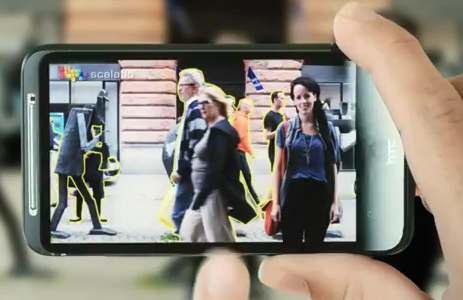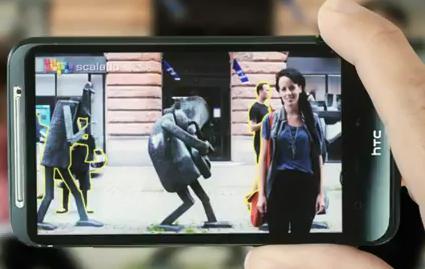| New Algorithm Takes Spoilers Out of Pics |
| Written by David Conrad | |||
| Thursday, 16 February 2012 | |||
|
How to remove those pesky people who walk right into your carefully planned photos? Now you can have them retouched from history simply by tapping on their images. Scalado has demoed a new image processing algorithm that allows a camera to automatically remove any moving objects from a scene. You know exactly how it happens - you try to take a photo but other people walk into the scene and spoil the result. With some skillful photo editing you can sometimes paint out the offending object by reconstructing the background. Now you can have a camera that lets you remove spoilers by tapping on them in the image. It magically removes people, cars of anything that moves into your shot as you take it. If you have ever tried to use a multiple-shot photo composition technique to assemble a panorama or stack a number of exposures to create a High Dynamic Range photo you will know that one of the big problems are people and objects that move between shots. In a panorama you get the same object in each frame and but in HDR you get a sort of ghost image. In the case of HDR the solution is fairly well known. All you have to do is use an image editor to paint the background from one image over the top of the moving object in another frame. The basic algorithm is that a moving object blocks out different areas of background in a set of sequential images, so you can use the background from each frame to create a finished image minus the moving object. This is exactly what Scalado Remove does. When you click the button it takes five frames in quick succession and this allows it to detect moving objects by doing a simple frame by frame subtraction. It can then present the user with a set of markers indicating the moving objects in a composite image and allow them to pick which should be removed and replaced by background from other frames.
Of course this isn't quite as simple as it sounds, and you can immediately guess at the sorts of problems that might occur. The first is that you have to have a set of frames that are spaced sufficiently to provide a clear background for even the slowest moving object. This means that the apparent exposure time goes up and the real subject of the shot has to hold still for that time. Any part of a spoiler that is moving in the opposite direction to the main object could end up with a very low total velocity and so not be removed from the final picture. For example, a pedestrian swinging their arms while walking could result in part of the arm being identified as stationary.
There is also the small question of art. Back in the days when plate cameras needed minutes per exposure, street scenes were often eerily empty. This is the reason that many old photos make busy cities look like ghost towns. This is a trick that you can use even today to create long exposure surreal images of empty streets. However, put the same facility on a point and shoot camera, and holiday photos could look quite different. Depicting empty tourist locations that don't quite capture the mood.
More InformationFurther ReadingImage deblurring using inertial measurement sensors
Comments
or email your comment to: comments@i-programmer.info
To be informed about new articles on I Programmer, subscribe to the RSS feed, follow us on Google+, Twitter, Linkedin or Facebook or sign up for our weekly newsletter.
|
|||
| Last Updated ( Thursday, 16 February 2012 ) |



